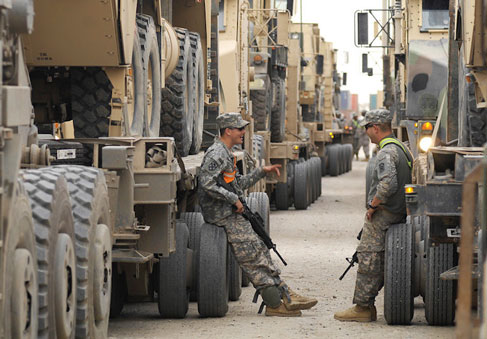“Burnout” is the mental strain and emotional distress that accompanies chronic work stress. It’s a risk in any job but can be practically common among Service Members because of the nature of their duties and the challenges of military life for Warfighters and their families. When Service Members experience burnout, it can impact performance, mission readiness, mental health, and even their relationships. Still, a strong support network, effective leadership, and a focus on building healthy relationships at home and work can help buffer against burnout—and keep you and your team ready for action.
What causes military burnout?
Burnout is commonly recognized as a reaction to combat stress. In fact, it’s also a common reaction to chronic military work stress during times of peace. The challenge is that the risk factors for burnout tend to be unavoidable within military environments.
For example, work overload can cause feelings of burnout. However, the long hours and high-pressure tasks are simply part of the job when you’re in the military because your mission doesn’t end at 5 p.m. Lack of control over your job duties and even inconsistency in assignments can also put you at risk for burnout. As any Warfighter knows, lack of control is part of service: You’re told what to do, where to go, what to wear, and where to live. You don’t always have insight into why decisions are made, and you have to follow your orders as they’re given—whether you like it or not. And those orders can vary greatly from day to day, which can be difficult to manage. One day your mission might be to clean the barracks, and the next it might be completing field training. That inconsistency can make it hard to really know if you’re doing your job well or even what your job responsibilities truly are.
Another risk for burnout is when your job duties conflict with each other or your personal responsibilities. This can happen when you don’t have the resources to complete a task or project, or if you’re balancing the needs of many different people. And if your work duties conflict with the needs of those at home (for instance, when it’s time for a PCS), you might feel that extra stress. It goes the opposite way too. For example, if you’re feeling stressed at home or in other areas of your life, you might suddenly be less able to cope with work stress, which also causes burnout.
One of the best ways to prevent burnout is to build up your social-support systems at home and work.
Effects of burnout
So why does it matter if Warfighters are burnt-out? The short answer is that it affects performance, impacts mission readiness, and can compromise the well-being of the military force. The long answer is that burnout has negative impacts for your health and the military as a whole.
| For the Warfighter | For the Military |
|---|---|
|
|
Ways to prevent and address burnout
No matter how you look at it, military life is stressful, and your job is demanding. It’s the perfect storm for burnout, and it isn’t going to change anytime soon. But one of the best ways to prevent burnout is to build up your social-support systems at home and work.
Focus on cohesion and morale.
To address burnout where it occurs, it’s important to build and foster healthy relationships at work. When morale and cohesion are higher, burnout is less common. To feel like you have friendships with your co-workers and support from them is key because you’ll be more likely to divvy up work responsibilities, share information, and ask for help when you need it.
Work on your leadership style.
Leaders can help shape the team climate as well as the way work and time are managed among their Warfighters. In addition to building a team environment that enables trust, support, and cohesion, military leaders need to have strong interpersonal skills. Leaders with high emotional intelligence and good communication skills are likely more aware of whether their team is overloaded or overstressed and can react before burnout occurs. Another way leaders can help prevent burnout is by giving regular feedback to their team members. Whether it’s constructive or simply a “good job,” feedback helps keep your team positive, on track, and motivated.
Build healthy relationships at home.
Since burnout is basically an overdraw on your emotional resources, preventing stress at home can help you bounce back. Even if the stress starts at work, the drain on your focus, emotional regulation, and positivity will all spill over to your personal relationships. The opposite is true too. In fact, burnout at work is more common among people who are unhappy in their relationships at home. But your personal support systems—friends, family, and battle buddies—can also help relieve some of your stress if your relationships are healthy. Some research suggests that relationships with those outside of work can be particularly helpful in coping with emotional exhaustion and the negativity that accompanies burnout. So be sure to reach out for help and focus on building healthy relationships and partnerships to stay strong.
Have each other’s “6:00.”
Burnout usually happens over time, which means it can be tricky to spot, but also possible to prevent. One of the best ways to catch the early signs of burnout is to look for it! Keep an eye on your team members for signs of extra stress or if they seem to be having more difficulty than usual with managing their responsibilities. And open up to coworkers if you’re frustrated, overloaded, or struggling.
Visit our #GotMySix campaign for more information on how social support can improve your performance.
